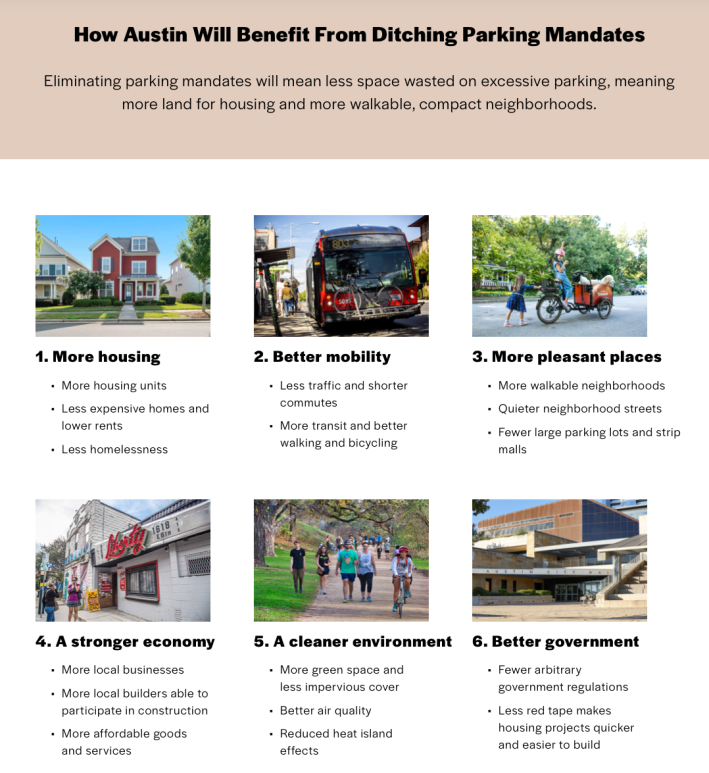Parking — you're banished from the Austin city limits.
Thanks to an 8-2 Council vote on Thursday, the mandatory installation of parking will become a thing of the past at virtually all new developments in the Texas capital, cementing the Violent Crown City as the largest U.S. metro to strike down the antiquated requirement.
The move is the culmination of a May resolution that required city planning staff to draft a "code amendment" that "removes parking requirements citywide" by the end of the year, with strong assurances that the council would then formally sign that amendment into law. And now that the ink is dry on that final rubber stamp, advocates are celebrating the latest addition to the growing list of more than 50 U.S. cities who have made the same reform.
“By embracing this change, Austin is now at the forefront of fostering compact, eco-friendly development, reducing costs, making homes more obtainable and commercial districts more vibrant and walkable,” said Mateo Barnstone, Director, at CNU-CTX. “Over time, this will incentivize the shift to alternative transportation options and transform parking areas into green spaces, housing, space for local businesses, and other community amenities, creating a better and more accessible city for all its residents.”

According to writer James Rambin, Austin's parking reformers faced unique challenges to revising the city's "famously antique land development code" — even after council members sent out victorious press releases announcing that they'd successfully voted "to end parking requirements citywide" five months ago.
Other communities, such as Norman, Okla., have transformed parking by simply changing the word "requirements" to "recommendations," but planners in Austin had to painstakingly remove minimums across a sprawling map of special zoning districts, planned unit developments, neighborhood conservation combining districts, and other exceptions to the prevailing city code. City staff also, admirably, took extra time to meet with disability groups to make sure the changes "maintained and even strengthened existing accessible parking requirements for new development."
🚨BREAKING🚨Austin Texas becomes the largest city in America to abolish minimum parking requirements city-wide!
— Parking Reform Network (@Parking_Reform) November 2, 2023
Years of targeted and consistent organizing from our partners at the Austin Parking Reform Coalition helped make this victory possible. Advocacy works! pic.twitter.com/djPav3lZmh
As complex as that process was, though, Austin's victory sends a message that with the right mix of strong local organizing, decisive action from elected officials, and diligent follow-through from city staff, parking reform is possible in every city in America — and that change can't come soon enough.
The Council member who sponsored the original resolution, Zohaib Qadri, argued that the move was necessary to reduce housing prices, estimating that the cost of a parking space in a structure such as a parking garage, could cost $60,000 per space — costs that get passed on to renters or buyers ... whether they have a car or not.
A recent study showed that New Jersey renters would save $1,000 per year on average if parking minimums were merely reduced to the average number of cars that households actually own.
This is a breaking story. We will update as needed






